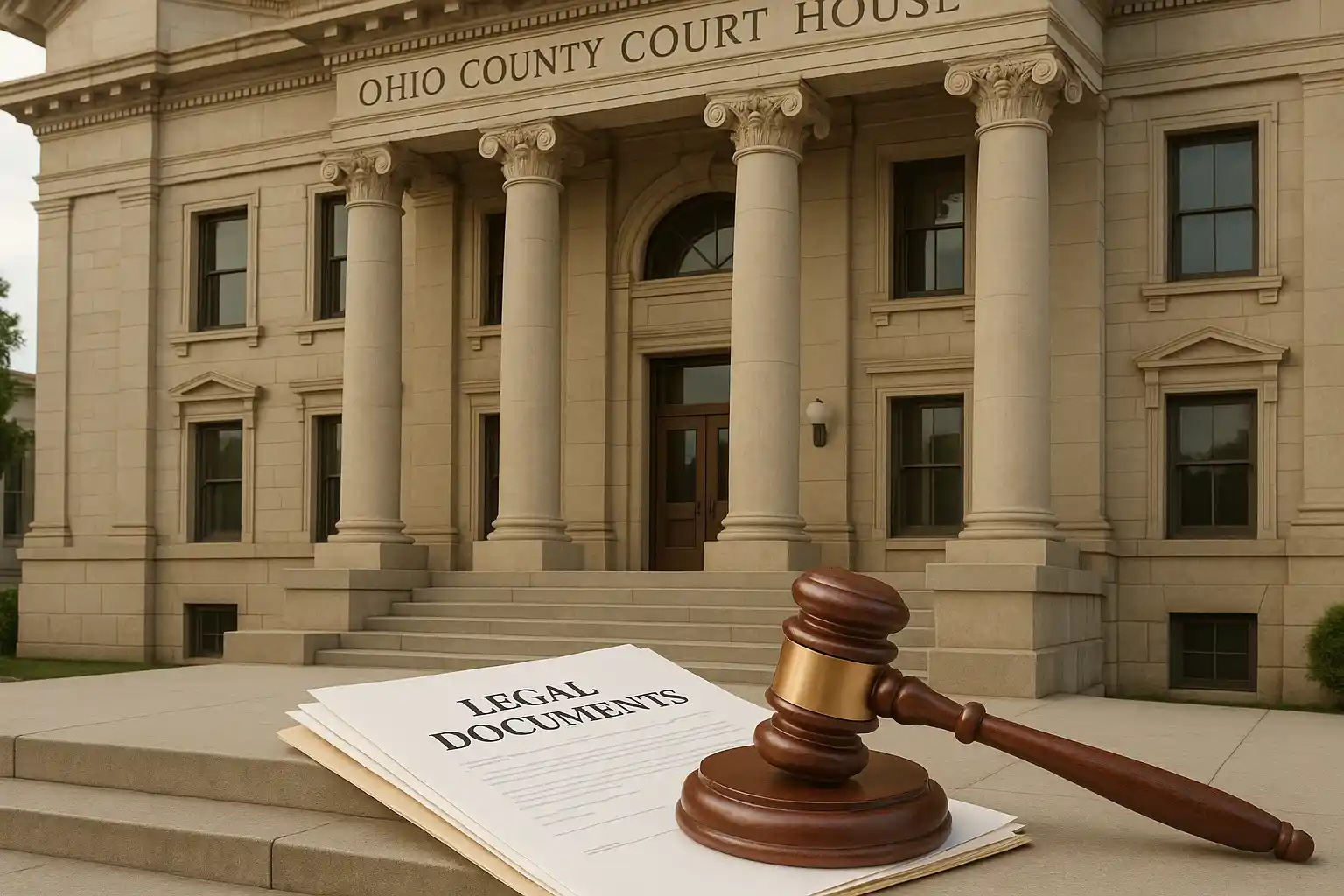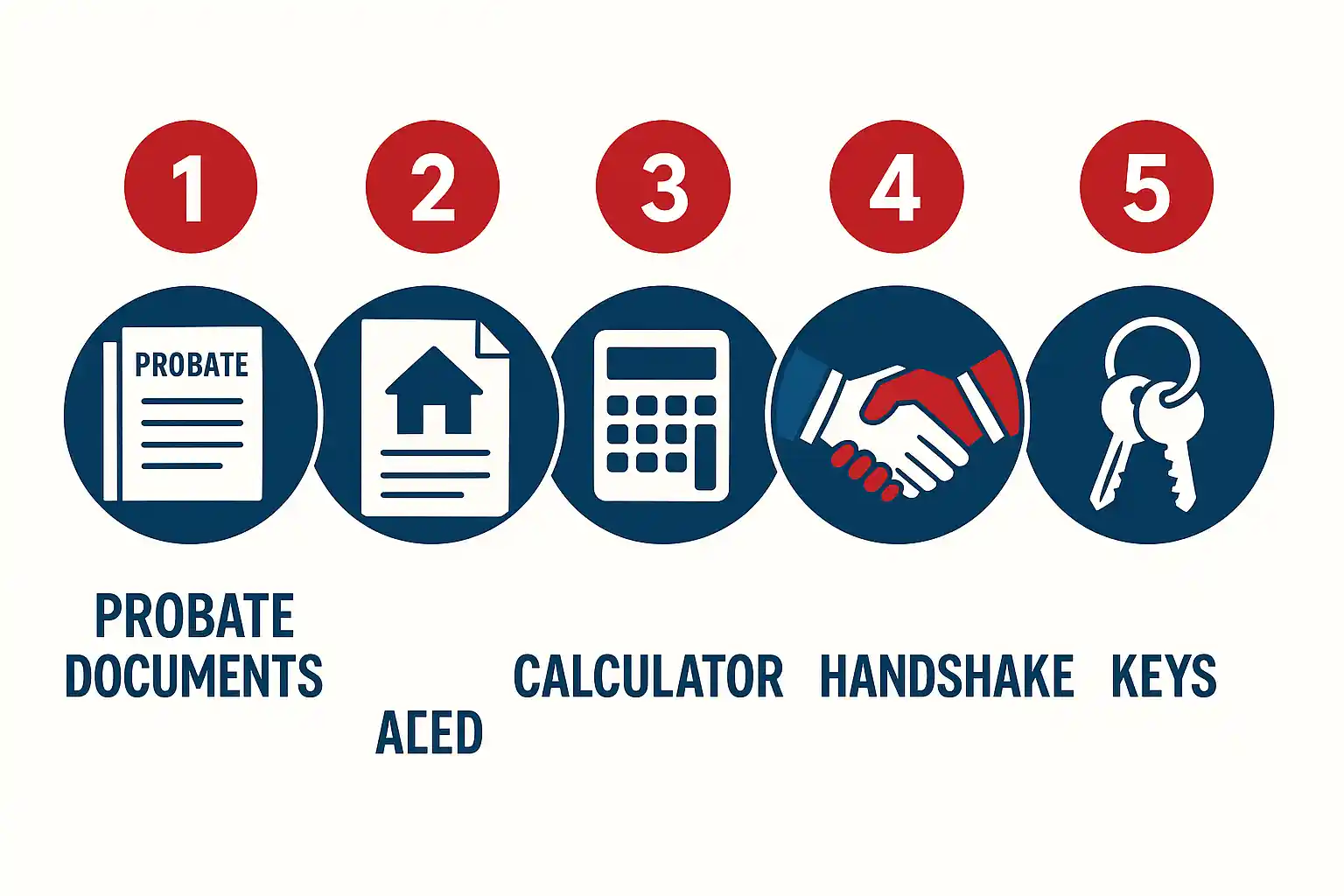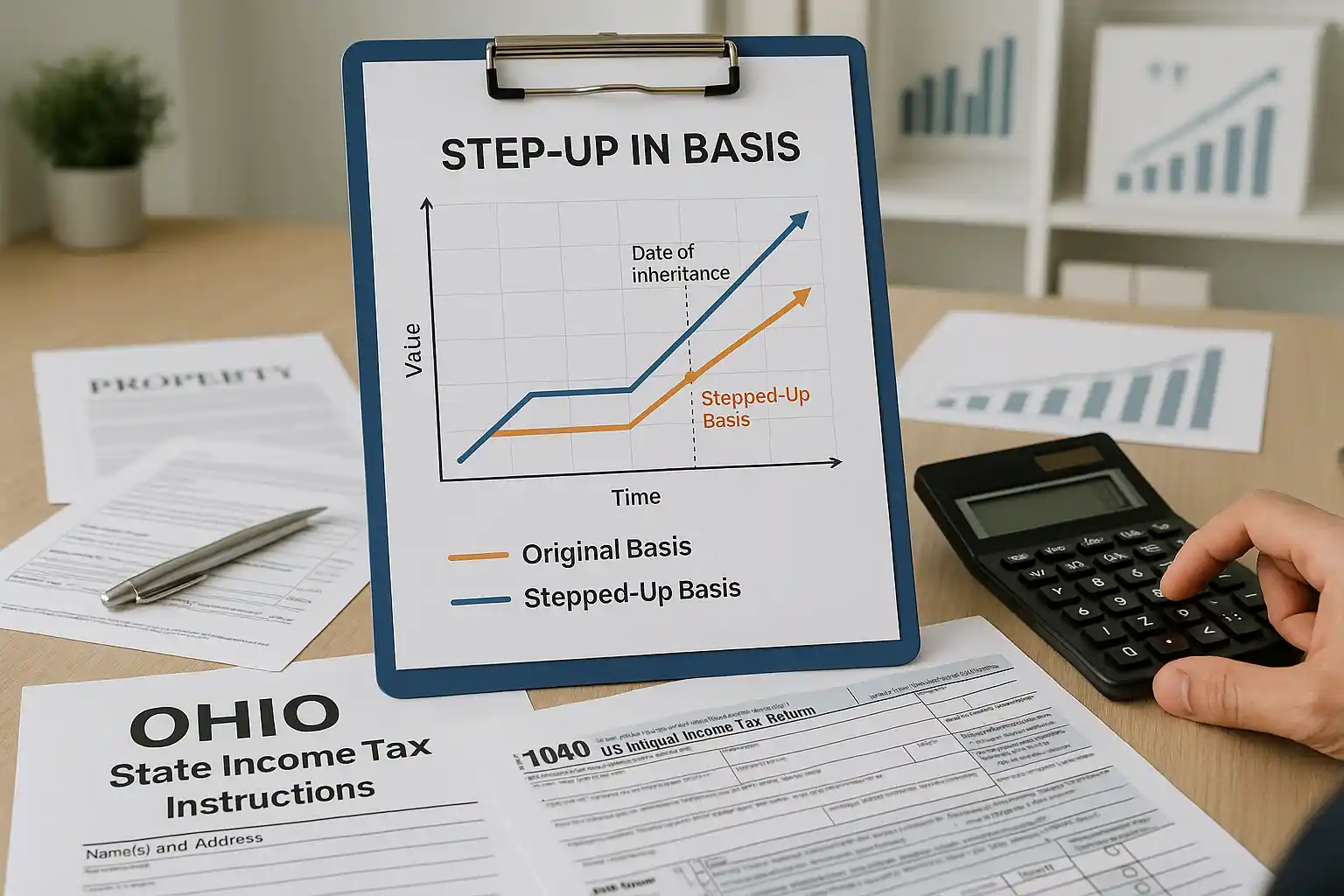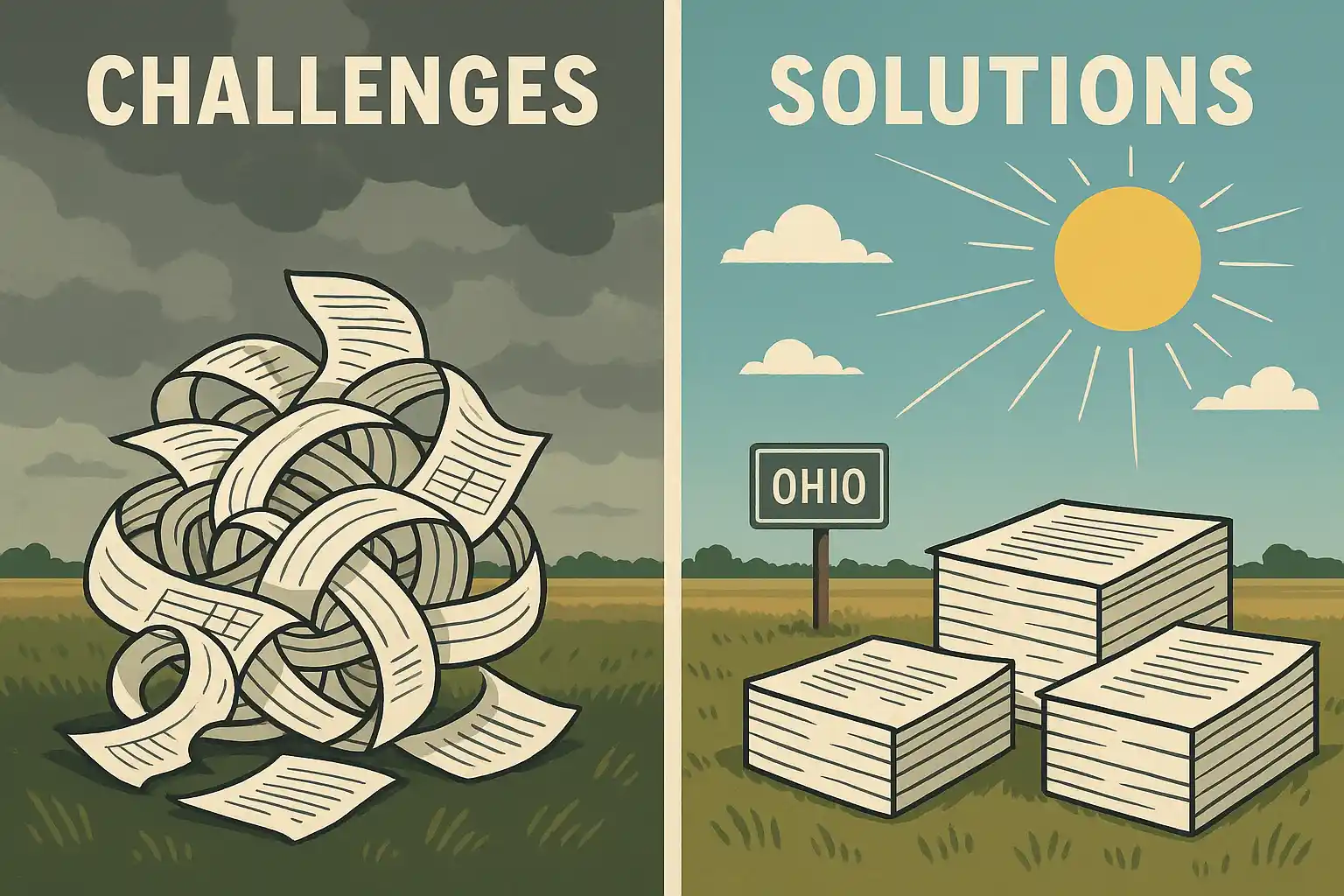Selling inherited land in Ohio involves completing probate court procedures, transferring a clear title, and understanding your tax obligations. Ohio's elimination of estate taxes and favorable federal step-up basis rules make it one of the most heir-friendly states, potentially saving you thousands in taxes while simplifying the legal process.
Let’s jump in and help you sell your inherited Ohio land!
Key Takeaways:
- Ohio eliminated estate and inheritance taxes, making it one of the most heir-friendly states for property sales.
- You'll receive a "step-up basis" equal to the property's value at death, potentially eliminating decades of capital gains taxes.
- Multiple heirs can force a sale through Ohio's partition action laws if family members can't agree on selling decisions.
Quick Note: If you're looking to avoid the complexities of probate sales and family negotiations, we buy Ohio land fast and can provide a free, no-obligation cash offer within 48 hours.

Understanding Ohio Probate Laws for Inherited Land
Inheriting land in Ohio can feel overwhelming, especially when you're already dealing with the loss of a loved one. The good news is that Ohio's probate system is designed to help families transfer property fairly and legally. Understanding the basics up front can save you time, money, and stress down the road.
Ohio's County-Based Probate System
Ohio operates probate courts in each of its 88 counties, and the court in the county where your loved one lived handles their estate. This local approach means you'll work with judges and staff familiar with your area's specific property laws and procedures.
Key aspects of Ohio's probate system:
- Each county probate court supervises estate administration
- The court ensures debts are paid and assets distributed properly
- Real property transfers require court approval before sale
- Probate provides legal protection for both heirs and creditors
When Probate Is Required for Ohio Land
Not every inherited property situation requires complete probate proceedings. Ohio law provides several pathways depending on your circumstances:
Complete probate administration is needed when:
- The estate includes real estate, and the total value exceeds $35,000
- Multiple heirs inherit property together
- There are outstanding debts against the property
- The will is contested or unclear
Simplified procedures available for:
- Small estates under $35,000 (Ohio Revised Code § 2113.03)
- Surviving spouse inheriting everything
- Estates with minimal assets beyond the land
Ohio's Intestate Succession Laws
If your loved one passed away without a will, Ohio's intestate succession laws determine who inherits the land. This can get complex quickly, especially with family property that's been passed down through generations.
Ohio intestate succession priority:
- Surviving spouse and children share the estate
- If no spouse, children inherit equally
- Parents inherit if no spouse or children
- Siblings inherit if no closer relatives survive
Real property inherited by multiple heirs becomes "tenancy in common," meaning each person owns a specific percentage but can sell their share independently.
Timeline and Documentation Requirements
Ohio probate typically takes 6-12 months, though complex estates or family disputes can extend this significantly. During this period, the property cannot be sold without court permission.
Essential documents you'll need:
- Original death certificate
- Will (if one exists)
- Property deed and tax records
- Letters of administration from the court
- Inventory and appraisal of estate assets
Remember, you don't have to navigate this process alone. Most families benefit from working with a probate attorney who understands Ohio law and can guide you through each step while protecting your interests.

Step-by-Step Process to Sell Inherited Land in Ohio
Selling inherited land in Ohio involves several important steps that must be completed in the correct order. While it might seem complicated at first, breaking it down into manageable steps helps ensure you don't miss anything essential or create legal problems down the road.
Step 1: Complete the Probate Process
Before you can sell inherited Ohio land, the probate court must officially transfer ownership to you. This legal step protects both you and future buyers by establishing a clear title.
What probate accomplishes:
- Confirms your legal right to own the property
- Resolves any outstanding debts against the estate
- Provides court documentation for title transfer
- Protects you from future legal challenges
The executor or administrator must file an Application for Certificate of Transfer (Ohio Revised Code § 2113.61) with the probate court, describing the property and requesting official transfer documentation. This certificate becomes your proof of ownership.
Step 2: Obtain Clear Title Documentation
Once probate is complete, you'll need to gather all necessary documents to prove clear ownership. Ohio title companies and buyers will require this paperwork before proceeding with any sale.
Essential documents to collect:
- Certificate of Transfer from probate court
- Original property deed showing previous ownership
- Title insurance policy (if available)
- Property tax records showing the current status
- Survey documentation (if available)
- Any liens or encumbrance information
If you discover title issues during this step, address them immediately with a real estate attorney. A clean title is essential for a smooth sale process.
Step 3: Determine Property Value and Market Conditions
Understanding your Ohio land's current market value helps you make informed decisions about pricing and sale method. Ohio's diverse landscape means property values vary significantly by location and land type.
Factors affecting Ohio land value:
- Location and proximity to development
- Zoning restrictions and permitted uses
- Access to utilities and roads
- Soil quality and environmental factors
- Local market demand and comparable sales
Consider getting a professional appraisal, especially for larger parcels or unique properties. For standard residential lots, online tools and recent comparable sales might provide sufficient guidance.
Step 4: Choose Your Sale Method
Ohio law gives you several options for selling inherited land. Each method has different timeframes, costs, and complexity levels. To dig deeper in our complete guide on how to sell land by owner in Ohio, we cover all the traditional selling methods in detail.
Traditional sale options:
- List with a real estate agent (6-12 months typical timeline)
- Sell by owner using online platforms (3-8 months)
- Auction through local auctioneers (2-4 months)
- Market to developers or investors (varies widely)
Cash buyer option:
- Direct sale to land investment companies (2-4 weeks)
- No realtor commissions or marketing costs
- Fast closing with minimal paperwork
- Ideal for urgent situations or problem properties
Step 5: Handle Tax Obligations and Closing
Ohio's favorable tax situation makes selling inherited land relatively straightforward from a tax perspective, but you'll still need to handle final details properly.
Final steps before closing:
- File any required tax forms
- Pay off outstanding property taxes
- Transfer utilities out of your name
- Cancel property insurance policies
- Prepare deed transfer documentation
The closing process typically takes 30-45 days with traditional buyers, or as little as 2 weeks with cash buyers who don't require financing approvals or extensive inspections.
Remember, selling inherited land doesn't have to be stressful. Whether you choose the traditional route or opt for a quick cash sale, having the right information and support makes all the difference in achieving your goals.

Tax Implications: Step-Up Basis and Capital Gains in Ohio
One of the few silver linings when dealing with inherited land is Ohio's favorable tax situation. Understanding these tax benefits can save you thousands of dollars and help you make smarter decisions about timing your sale. The good news is that Ohio makes things relatively simple compared to many other states.
Ohio's Elimination of Estate and Inheritance Taxes
Ohio significantly simplified the tax burden on inherited property by eliminating both estate and inheritance taxes. This puts more money back in your pocket compared to inheriting property in states that still impose these taxes.
Ohio's current tax status:
- No Ohio estate tax (eliminated in 2013)
- No Ohio inheritance tax (never imposed)
- No Ohio transfer taxes on inherited property
- Only federal taxes and ongoing property taxes apply
This means you won't face the additional state-level taxes that burden heirs in states like Pennsylvania or New Jersey. The Ohio Department of Taxation no longer requires tax release forms for most inherited property transfers.
Federal Step-Up Basis: Your Biggest Tax Advantage
The federal step-up basis rule provides substantial tax savings for inherited property. Instead of inheriting the original purchase price as your cost basis, you receive the property's fair market value at the time of death as your new basis.
How step-up basis works:
- Original purchase price becomes irrelevant for tax purposes
- Your basis equals fair market value on the date of death
- Eliminates decades of accumulated capital gains
- Applies to all inherited property, regardless of value
Real-world example: If your grandmother bought land for $10,000 in 1980 and it's worth $100,000 today, your basis becomes $100,000, not $10,000. If you sell immediately for $100,000, you owe zero capital gains tax.
Capital Gains Treatment for Inherited Ohio Land
When you do sell inherited land for more than the stepped-up basis value, you'll benefit from favorable federal capital gains treatment. The IRS automatically treats all inherited property sales as long-term capital gains, regardless of how long you owned it.
Federal capital gains rates for 2024:
- 0% for income up to $47,025 (single) / $94,050 (married filing jointly)
- 15% for income up to $518,900 (single) / $583,750 (married filing jointly)
- 20% for income above those thresholds
Ohio doesn't impose additional state capital gains taxes, so you only pay the federal rate. For detailed information about all tax obligations when selling Ohio land, including inheritance tax strategies for Ohio land sales, our complete tax guide covers every scenario.
Property Tax Responsibilities During Ownership
While you enjoy favorable treatment on sale taxes, don't forget about ongoing property tax obligations. Ohio property taxes become your responsibility once ownership transfers through probate.
Property tax considerations:
- Taxes are pro-rated from date of death
- Unpaid taxes may become your responsibility
- Agricultural or forestry exemptions may transfer with the land
- Some counties offer grief hardship extensions
Always verify the property tax status before completing your sale, as unpaid taxes can delay closing or reduce your proceeds.
Record-Keeping for Tax Purposes
Proper documentation protects you if the IRS questions your tax calculations. Keep detailed records throughout the inheritance and sale process.
Essential tax records to maintain:
- Probate court appraisal or professional appraisal at death
- Property tax assessments from the year of death
- Improvement receipts for any work done after the inheritance
- Sale contract and closing documents
- Legal and professional fees related to the inheritance
When to Consult Tax Professionals
While Ohio's tax situation is relatively straightforward, certain circumstances warrant professional tax advice. Don't hesitate to consult a tax professional if you're dealing with large properties, complex family situations, or if you've made improvements to the property.
Consider professional help when:
- The inherited property value exceeds $500,000
- Multiple heirs are involved in the sale
- The property generates rental or business income
- You're unsure about the accurate date-of-death value
- You've made substantial improvements since inheriting
Remember, the money you spend on proper tax planning often pays for itself through legitimate tax savings and peace of mind.

Common Challenges When Selling Inherited Ohio Land
Selling inherited land comes with unique obstacles that regular property sales don't face. While each situation is different, most Ohio families encounter similar challenges that can delay sales, increase costs, or create family stress.
Title and Ownership Complications
Inherited property often comes with title issues that weren't problems while your loved one was alive, but surface during the sale process. These "clouds" on the title can stop a sale in its tracks until they are resolved.
Common Ohio title problems include:
- Missing or incomplete probate documentation
- Undiscovered liens from medical bills or tax obligations
- Previous owners who didn't properly transfer title
- Boundary disputes with neighboring properties
- Easement issues are not documented in prior deeds
Warning signs of title problems:
- Multiple names on old deeds that don't match current family
- Property tax bills showing different ownership information
- Neighbors claiming use rights or boundary disputes
- Missing documentation from previous transfers
If title issues emerge, you'll need an Ohio real estate attorney to resolve them before any buyer proceeds. For comprehensive information about probate documentation for Ohio land sales, our detailed guide covers all required paperwork.
Carrying Costs During Extended Sale Periods
Traditional land sales in Ohio typically take 6-12 months, and during this entire period, you're responsible for all carrying costs. These expenses add up quickly and can significantly reduce your final proceeds.
Monthly carrying costs include:
- Property taxes (often $100-500+ per month depending on assessed value)
- Property insurance (if maintaining coverage)
- Utilities for any structures on the land
- Maintenance and upkeep expenses
- HOA fees (if applicable)
- Security or caretaking costs for vacant land
Annual expenses that become your responsibility:
- Property tax bills due during your ownership
- Required inspections or environmental assessments
- Legal fees for ongoing ownership issues
- Accounting costs for tax preparation
Many families underestimate these costs, especially when the sale process drags on longer than expected. A property that seems profitable at first glance may become a financial drain if it sits on the market for an extended period.
Market Timing and Pricing Challenges
Inherited land often sits vacant for months or years before families decide to sell, during which time market conditions can change significantly. Additionally, determining fair market value becomes challenging without recent comparable sales.
Pricing complications for inherited Ohio land:
- Outdated property assessments that don't reflect current market
- Lack of recent comparable sales in rural areas
- Seasonal market fluctuations affecting land values
- Local development changes impacting desirability
- Condition deterioration during vacancy affecting value
Market timing issues:
- Pressure to sell quickly due to carrying costs
- Family disagreements about waiting for better market conditions
- Buyer financing difficulties in rural or undeveloped areas
- Limited marketing channels for vacant land
- Competition from other inherited properties in the area
Legal and Administrative Complexity
Ohio's probate process, while more streamlined than many states, still creates administrative burdens that many families find overwhelming. Missing deadlines or filing incorrect paperwork can delay sales significantly.
Administrative challenges include:
- Coordinating between probate court, title company, and buyers
- Meeting Ohio's specific documentation requirements
- Understanding tax implications and filing requirements
- Managing multiple professional relationships (attorneys, realtors, appraisers)
- Keeping family members informed and in agreement
Potential legal complications:
- Disputes over executor authority or decision-making
- Creditor claims that delay probate completion
- Will contests or questions about inheritance validity
- Environmental liability concerns for older properties
- Zoning or land use restrictions limiting buyer options

Multiple Heirs: Selling Inherited Ohio Land with Siblings
When multiple family members inherit Ohio land together, decision-making becomes significantly more complex. Ohio law treats co-inheriting siblings as "tenants in common," meaning each person owns a specific percentage, but everyone must agree on major decisions like selling the property.
Understanding Ohio's Tenancy in Common Laws
Ohio automatically creates tenancy in common ownership when multiple heirs inherit property. This arrangement gives each heir equal rights to use the entire property, but also equal responsibility for costs and decisions.
Key aspects of Ohio tenancy in common:
- Each heir owns a fractional interest in the whole property
- No single heir can sell without the others' consent
- All heirs share property taxes and maintenance costs
- Each heir can sell their interest (but buyers are rare)
When Heirs Disagree: Ohio Partition Action Laws
If siblings cannot reach an agreement about selling inherited Ohio land, any heir can file a partition action in court. Ohio partition laws provide a legal mechanism to force a sale when cooperation breaks down.
Ohio partition process:
- Any co-owner can initiate partition proceedings
- Court attempts physical division first (rarely practical for land)
- If physical division isn't feasible, the court orders the sale
- Proceeds are divided based on each heir's ownership percentage
- Legal costs are typically deducted from sale proceeds
Alternative Solutions Before Legal Action
Smart families explore collaborative solutions before resorting to partition lawsuits, which consume time and money that could otherwise go toward maximizing sale proceeds.
Buyout arrangements:
- One or more heirs purchase others' interests
- Professional appraisal determines fair buyout price
- Payment plans or financing can make buyouts feasible
Family mediation options:
- A neutral third party facilitates family discussions
- Often resolves disputes faster and cheaper than court action
- Preserves family relationships better than adversarial litigation
Cash sale advantages for multiple heirs:
- Eliminates prolonged family negotiations
- Provides quick, equal distribution of proceeds
- Reduces ongoing carrying costs and maintenance responsibilities
- Minimizes emotional stress during complex family dynamics
Remember, partition actions become part of the public record and can be emotionally devastating for families. Most Ohio probate attorneys recommend exhausting collaborative options first, including considering cash buyers who can close quickly and divide proceeds fairly among all heirs.

Fast-Track Option: Selling Inherited Ohio Land for Cash
Dealing with inherited land while grieving doesn't have to add months of stress to your life. At Prime Land Buyers, I've helped hundreds of Ohio families skip the traditional sale hassles and get cash in hand quickly.
Why Cash Sales Make Sense for Inherited Land
Traditional land sales average 6+ months in Ohio, but inherited property often faces additional complications that extend timelines even further. Our cash process eliminates these common roadblocks.
Problems we solve:
- No waiting for buyer financing approvals
- We handle all title issues and paperwork
- Skip costly repairs or property improvements
- Avoid realtor commissions (typically 6-10%)
- No carrying costs during extended marketing periods
Our Simple 3-Step Process
We've streamlined everything to reduce your stress during this difficult time.
- Step 1: Submit your property details online
- Step 2: Receive your cash offer within 24-48 hours
- Step 3: Close in as little as 14-21 days with our escrow service
Ready to Move Forward?
You don't have to navigate probate complications, family disagreements, or market uncertainties alone. Our team handles inherited Ohio land sales every week, and we understand the unique challenges you're facing.
Ready to sell your Ohio land for cash? Get your free, no-obligation offer today.

